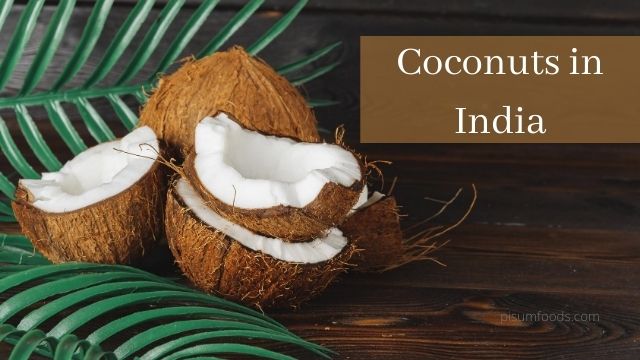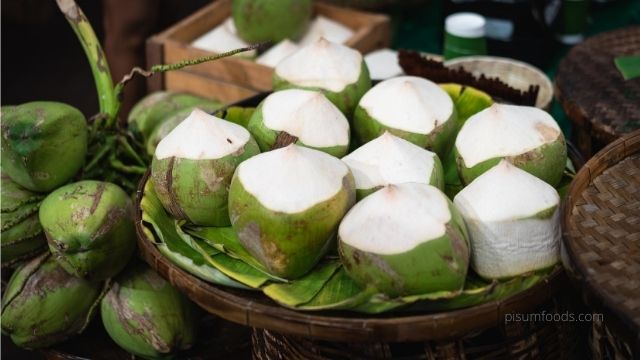 Translate
Translate Translate
TranslateI belong to the Srikakulam District in Andhra Pradesh which is broadly famous for two things, one is for Coconut Fields and second for Cashew Trees. Whenever I visit my place, I always wonder why coconut is preoccupied in the minds of the people? What is the speciality hidden behind a simple coconut which makes it staple? But, when I understood its uses and benefits, I felt it was worth it.

Every part of the coconut is beautiful and beneficial. From the farms to our urban houses, we can spot coconuts anywhere. There are many recipes which are made up of coconut- Coconut Barfi, Coconut Ladoo, Curries, Coconut Chicken Stew, Chicken Biryani with Coconut Milk, Khao Soi (a famous Burmese Dish), Coconut Panna Cotta, Kombu Barthad (Coorgi dish), Coconut Rice (famous in southern parts of India), and many more. The aroma of coconut makes people feel like they are on a tropical holiday.
Coconut water is more hydrating than normal water, as it makes a person stay hydrated for a long time.
Organic Coconuts are helpful for skin care as it contains antibacterial and anti-inflammatory properties, which provide good moisturization and nourishment to the skin.
We can use Coconut Oil in cooking, or as hair oil, or even as a makeup remover, and so on.
Coconut Milk is rich in Vitamin B, C, E as well as it contains iron, magnesium, calcium, phosphorus, etc.
Consumption of Coconut helps to improve Blood Pressure and fight against Cardiovascular diseases.
Coconut is a digestion-friendly tropical fruit which contains fibre and good cholesterol.
Studies have found that consumption of coconut on a daily basis might be in the form of coconut water or flesh will boost the immune system.
It helps to cure abdominal pain, nausea, vomiting, diarrhoea, itching of the mouth, irritation in the throat or skin, etc.
It is also useful in making Jaggery and good quality juice.
It helps in quick metabolism of carbohydrates, proteins and fats.
Coconut Oil Pulling is one of the best ways to remove bacteria from teeth and gums.
Eco-friendly Coconut Cups, bowls and mugs which are made up of Dry Coconut Shells helps to reduce the pollution and decrease the uses of Plastic Cups.
India is one of the largest coconut producers in the world including 19% share (approx.) in the total global import. Our country is the third-largest producer of coconuts in the world after Indonesia and the Philippines. According to tridge.com, total coconut production volume is 11.13M (Metric Ton), ranked 4th position in the global export with the value of $53.11M USD. The Western Ghats are the major coconut exporters in India. And, the total imports last year were $1.85M USD.
Major Coconut producing states in India are Kerala, Karnataka, Andhra Pradesh, Tamil Nadu and Goa. These are also the major coconut suppliers in India. Some of the other states like West Bengal Bengal, Maharashtra, Gujarat also produce coconuts but in a lesser proportion. Coconuts are grown mostly in the Southern Part of India. This is because of certain climate characteristics which are necessarily required for its growth. The suitable environment is puff weather, heat, light and loam soils due to high presence of sand in it, little salty land and drought, etc. All these characteristics help to grow a healthy tree of an average height of 22 metres. The lifespan of a single coconut tree is 60-80 years. It is known as a three-generation-tree belonging to a family of Palm Trees. It takes more time to mature and bear coconuts i.e. at least 6-10 years and bears 60-65 fruits per year by a single coconut tree.
There are different varieties of Coconuts produced in India including- West Coast Tall (commonly sold coconut), which has more oil content; East Coast Tall, which starts giving fruits at a very early age (around 6-8 years); Chandrakalpa, which can be grown in moist climate also; Chowghat Orage Dwarf/ Chowghat Green Dwarf, which are the Dwarf Coconut varieties; Kera Sagara which gives a yield of 90-100 fruits every year; and many more. PISUM FOOD SERVICES is one of the leading food exporters in India, which provides a wide variety of food products which includes fruits, vegetables, herbs, beverages, oilseeds, spices, etc. It is also engaged in exporting Fresh Coconut Fruits from India which contains wide varieties of coconuts and standard quality products. Pisum Foods ensures to provide the best products from the best suppliers in India.

We all know the importance of growing a plant whether it is at home or in a garden. Growing trees are very important to lead a life on earth. Plants and trees help us to breathe, give us food & shade, clean air, soil & water and make our world more beautiful by providing a habitat for human beings and animals. The increase in the proportion of pollution in the soil gradually results in decreasing the yield of plants. The quality and value of the soil are greatly reduced. So now it becomes very important to show some concern towards plants and trees which are very important and valuable resources for mankind.
There are several causes of pollution which affect soil quality like agricultural activities, mining, overgrazing, nuclear waste, chemical waste, construction activities, loss of biodiversity, and many more. But, on the other hand, there are some ways which need to become more likeable and can bring possible outcomes in the field of agriculture. One such way is – coconut peat also known as coco peat. It is now doing an outstanding job by safeguarding plants, trees, forests, and agricultural areas.
Coco peat is a powder-like substance made up of coconut husk or coconut coir. It has many advantages like, it is environmental-friendly in nature, it helps to protect the plant from diseases and is entirely sufficient for the healthy growth of a plant, it add-ons anti-fungal properties and certain micronutrients to the soil improves the soil quality, it acts as a fertilizer which prevents the plant from soil-borne pests.
There are lots of benefits using coco peat in pots and horticulture: -
It keeps the plant healthy.
Coco peat is used to control soil erosion.
It is used in greenhouse farms.
It is highly absorbent in nature and high-water holding capacity i.e. it can hold up to 30% more water as compared to normal fertilizers.
Its antibacterial properties help a plant from decaying.
Coco peat is free from weeds and seeds.
It is an alternative to mined peat moss.
It is alkaline in nature, which has a pH value of 5-7, that is considered to be ideal for the growth of a plant.
Top coconut exporters in India use coco peat as one of their coconut products to export in the international market. It is known as coir pith or coir peat internationally. It has several mercantile applications across the world. Plants and vegetables which can grow without soil are facing increasing demand nowadays. This leads to an increase in the demand for coco peat. Such fruits and vegetables are known as hydroponics. These hydroponic fruits and vegetables are extremely healthy and nutritious in nature.
Previously people were unaware of the benefits of the coconuts and their by-product but, gradually coconuts are creating a huge value in the national as well as in the international market. One can use coconut as a whole by consuming its water, flesh and even its husk. Nature itself has been providing plenty of solutions to the major environmental problems, only we need to find and utilise them.
Pisum Foods is undoubtedly one of the best coconut exporters from India. With the diverse range of products they export and their excellent services, Pisum Foods always helps their clients in every way possible and make sure that the clients are happy and satisfied with their services. They have extensive experience in the export industry and make sure that the coconuts export from India is carried without any hassle. If you are looking for a food exporter from India, Contact Pisum Foods now!